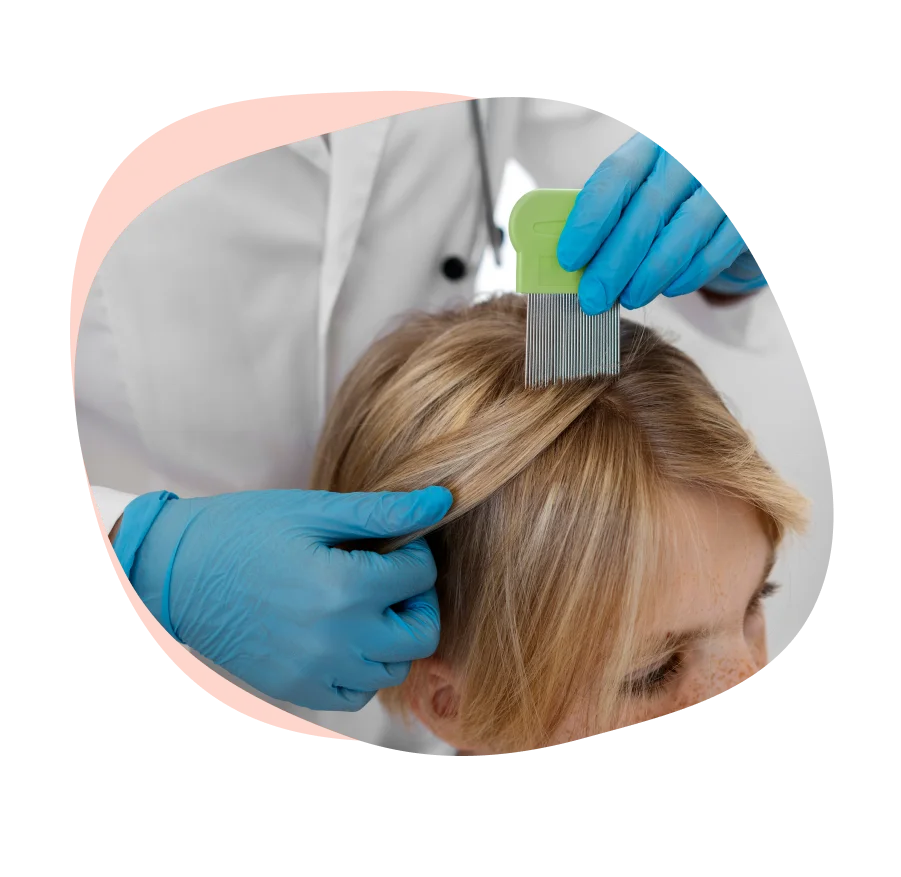Scalp Folliculitis
Scalp Folliculitis ![]()
What is Scalp Folliculitis
Scalp folliculitis occurs when hair follicles become inflamed, usually due to bacterial or fungal infection. This inflammation can result in small red bumps, pustules, or crusts on the scalp, accompanied by itching, tenderness, and sometimes hair loss. Scalp folliculitis can affect anyone, but it’s more common in people with certain risk factors, such as those with oily skin, frequent sweating, or compromised immune systems.
Symptoms of Scalp Folliculitis
The symptoms of scalp folliculitis can vary depending on the underlying cause and severity of the condition. Common signs and symptoms include:
Small red bumps or pustules on the scalp
Itching, tenderness, or discomfort
Scalp pain or soreness
Crusting or scabbing of affected areas
Hair loss or thinning in severe cases
Causes of Scalp Folliculitis
Several factors can contribute to the development of scalp folliculitis, including:
- Bacterial infections: Common bacteria such as Staphylococcus aureus can infect hair follicles, leading to inflammation and folliculitis.
- Fungal infections: Yeasts such as Malassezia can also cause folliculitis known as pityrosporum folliculitis, particularly in individuals with predisposing factors like excessive sweating or poor hygiene.
- Razor bumps (Pseudofolliculitis Barbae): Resembling folliculitis, this rash results from ingrown hairs, not infected follicles. It predominantly affects individulas with curly hair who shave too closely, typically seen on the face and neck.
- Immune system disorders: Conditions that weaken the immune system, such as HIV/AIDS or diabetes, can make individuals more susceptible to scalp folliculitis.
Scalp Folliculitis ![]()
![]()
![]()
![]()
![]()
Treatment Options for Scalp Folliculitis
Treatment for scalp folliculitis depends on the underlying cause and severity of the condition. Common treatment options include:
- Antibacterial or antifungal medications: Topical or oral antibiotics may be prescribed to treat bacterial infections, while antifungal agents are used for fungal infections.
- Antiseptic shampoos: Medicated shampoos containing ingredients like benzoyl peroxide, salicylic acid, or ketoconazole can help reduce inflammation and control infection.
- Warm compresses: Applying warm compresses to affected areas can help soothe inflammation and promote healing.
- Avoiding irritants: Avoiding harsh hair care products, chemical treatments, or tight hairstyles can help prevent further irritation and recurrence of folliculitis.


Scalp Folliculitis ![]()
![]()
![]()
![]()
![]()
Conclusion
Scalp folliculitis is a common condition that can cause discomfort and affect the appearance of the scalp. If you’re experiencing symptoms of scalp folliculitis, it’s important to consult with a dermatologist for an accurate diagnosis and appropriate treatment. With the right approach, scalp folliculitis can be effectively managed, allowing you to enjoy a healthy scalp and hair.
If you have any concerns about scalp folliculitis or would like to explore treatment options, don’t hesitate to reach out to us at AlloRoots Hair Restoration. Our experienced team is here to help you achieve optimal scalp health and well-being.
Why Choose Us?


Premier Surgeons: Expert alumni from AIIMS Delhi with 10+ years of experience.


Maximum Viability: Optimize graft survival with cutting-edge advanced Technology (Realtime Bio- Enhanced FUE)


Natural Hairline Design: Achieve the most natural hairline with 3000+ success stories.


Uncompromised Safety: 100% doctor-led surgeries with strict safety protocols.
Scalp Folliculitis![]()
![]()
![]()
![]()
![]()
Frequently Asked Questions
What is scalp folliculitis?
This is an inflammatory condition of the scalp hair follicles, which normally gets infected or inflamed. It normally presents with small, itchy, pus-filled bumps on the scalp.
The causes of scalp folliculitis:
How does scalp folliculitis get treated?
How does scalp folliculitis get treated?
Management of scalp folliculitis typically centers around antibacterial or antifungal shampoos, good hygiene, and the topical use of antibiotics such as mupirocin, or in severe cases, oral antibiotics.
Does scalp folliculitis result in hair loss?
Hair loss can result if the scalp folliculitis is not treated and the follicles become permanently damaged as a result of scarring. As such, immediate treatment is essential to preventing permanent hair loss.
Is Scalp Folliculitis Contagious?
Generally, this is a non-infectious condition, but if it is caused due to bacterial or fungal infection, in that case, it may result in closeness with the affected person, sharing some personal items, or objects like combs or hats.
Is it possible to prevent scalp folliculitis?
Prevention of scalp folliculitis comprises good scalp hygiene, avoidance of irritating hair care products, and nonshared grooming personal items. General cleanliness of the scalp, especially after sweating, can aid in the prevention of scalp folliculitis.
Can scalp folliculitis be treated at home?
A wide range of home remedies, including warm compresses, tea tree oil, and apple cider vinegar, may help in minimizing the symptoms in the case of mild folliculitis of the scalp. Still, a healthcare expert must be consulted to obtain a proper diagnosis and treatment option.
Reach Out for a Hair Transformation Today!
Contact Us.
Delhi: C-26, First Floor, Greater Kailash 1, New Delhi, 110048, India
Bhubaneswar: 2nd Floor, D 1 Square , Nandan Kanan Road , KIIT Square, Patia, Bhubaneswar, Odisha 751024
Uttarakhand: Gularbhoj Rd, near The Royal Gym, Dineshpur, Gurunanakpur, Uttarakhand 263160
Chennai: 39/2, RK Shanmugam Salai, Goutham Colony, K. K. Nagar, Chennai, Tamil Nadu 600078




